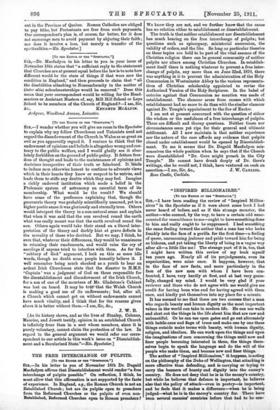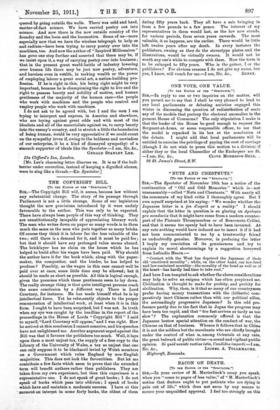"INSPIRED MILLIONAIRES."
[TO THE EDITOR OF THE " SPECTITOR."3 SIR,—I have been reading the review of "Inspired Million. aircs " in the Spectator as if it were about some book I had never heard of before, and as if this strange monster, the author—who seemed, by the way, to have a certain odd unac- counted-for resemblance to me—ought to have something done to him and really ought to be suppressed. I had something the same feeling toward the author that a man has who looks frankly into the face of a gorilla for the first time—a feeling of queer, unreasoning jealousy and pride toward him for being so hideous, and yet taking the liberty of being in a vague way after all—a little like me! The strange part of it is, too, that I might have written this review of my book myself ten years ago. Nearly all of its prejudgments, even its superiorities, were mine once. It happens, however, that in the face of new facts, and more particularly in the face of the new men with whom I have been con- fronted, I have, very hardly at first, and at last very grate- fully, changed my mind. I would be very glad if your reviewer and those who do not agree with me would give me credit for having been wise and for having agreed with them once, and kindly put themselves into my place for a minute.
It has seemed to me that there are two courses that a man who regards beauty and human dignity as the most important values in the world can take in modern life. He can use walls and shut out the things in the life about him that are raw and unbeautiful. Or he can use open gates and go out alternately with battle-axes and flags of truce and make one by one these things outside make terms with beauty, with human dignity, religion, and idealism. He can work upon the things and upon the imaginations of men concerning the things until new and finer people becoming interested in them, the things them- selves begin to speak the language and do the will of the people who make them, and become new and finer things.
The author of "Inspired Millionaires," it happens, is acting on the philosophy of the Duke of Wellington, that attacking is more effective than defending, and is carrying or trying to carry the banners of beauty and dignity into the enemy's country. He does not deny that be is in the enemy's country, but while he believes that defence is important, he believes also that the policy of attack—even in poetry—is important, and he feels that it makes a difference—when he is being judged—what he is in the enemy's country for. There have been several enemies' countries before that had to be con-
quered by going outside the walls. There was cold and hard, matter-of-fact science. We have carried poetry out into science. And now there is the new outside country of the foundry and the loom and the locomotive. Some of us—more especially now that we have the wireless telegraph to help us and radium—have been trying to carry poetry over into the machines, too. And now the author of " Inspired Millionaires " has gone one step further and asserted that there may be, if we insist upon it, a way of carrying poetry over into business ; that in the present great world-battle of industry lowering over human life there may be just now poetry, adventure, and heroism even in wealth, in making wealth or the power of employing labour a great social art, a nation-building pro- fession. If he is right in this, his being right might be very important, because he is championing the right to live and the right to possess beauty and nobility of motive, and human gentleness of the majority of the human race—the people who work with machines and the people who control and employ people who work with machines.
I do not ask to be agreed with, but I and the men I am trying to interpret and express, in America and elsewhere, who are trying against great odds and with most of the idealists and all of the materialists against us, to carry beauty into the enemy's country, and to stretch a little the boundaries of being human, would be very appreciative if we could count on the sympathy (even if, owing to the boldness and unwisdom of our enterprise, it be a kind of dismayed sympathy) of a staunch supporter of ideals like the Spectator. —I am, Sir, &c.,
GERALD STANLEY LEE.
12a Clifford's Inn, London.
[Mr. Lee's charming letter disarms us. It is as if the bull- terrier under correction, instead of keeping a dignified silence, were to sing like a thrush.—En. Spectator.1



















































 Previous page
Previous page